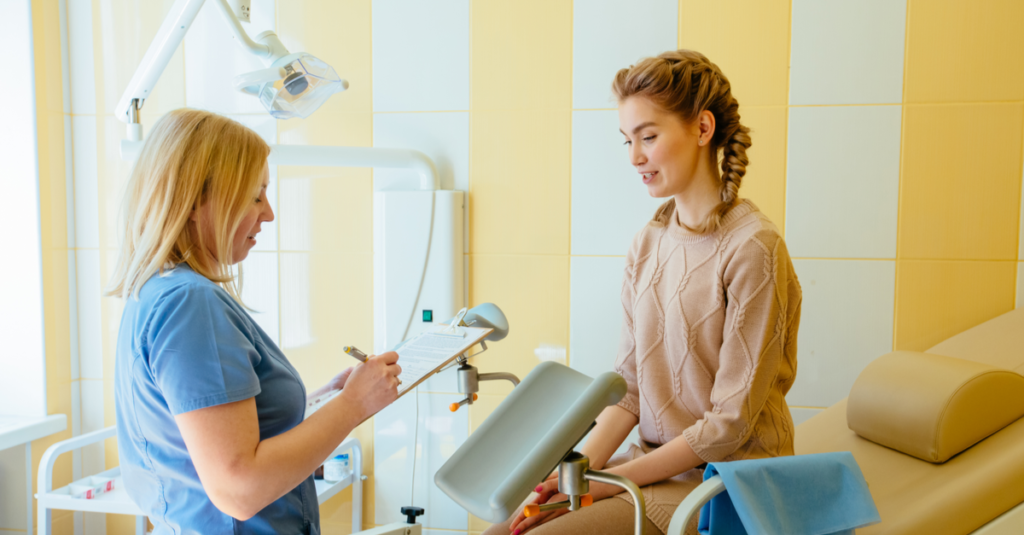How Your OB-GYN Help You Get Pregnant

If you’re trying to conceive, you may wonder if your OB-GYN can help you in your journey towards pregnancy. The good news is that your OB-GYN can play a vital role in your fertility journey. This article will explore the various ways in which your OB-GYN can assist you in getting pregnant.
Understanding the Role of Your OB-GYN in Fertility
Your OB-GYN, also known as an obstetrician-gynecologist, is a medical professional who specializes in women’s reproductive health. They have undergone extensive training to understand the complexities of the female reproductive system and are well-equipped to address various fertility concerns that you may have. In addition to providing prenatal care and assisting in childbirth, OB-GYNs play a crucial role in helping individuals and couples navigate the journey to conception.
When you visit your OB-GYN for fertility-related issues, they will conduct a thorough evaluation to assess your reproductive health. This may include reviewing your medical history, performing physical exams, and ordering specific tests to identify any underlying conditions that could be affecting your fertility. By taking a comprehensive approach to your care, your OB-GYN can develop a personalized treatment plan tailored to your unique needs and goals.
OB-GYNs can help you understand the biological processes involved in becoming pregnant and offer insights into optimizing your fertility. They can provide valuable information on when and how often to have intercourse, as well as offer advice on lifestyle adjustments that may enhance your chances of conception. Additionally, your OB-GYN can discuss various fertility treatments and procedures that may be available to you, such as ovulation induction or in vitro fertilization (IVF), and help you make informed decisions about your reproductive health.
Common Fertility Assessments Performed by OB-GYNs
When deciding to consult with your OB-GYN about fertility concerns, they may perform various assessments to evaluate your reproductive health. These assessments are crucial steps in understanding your fertility status and addressing any potential issues that may be hindering conception.
One of the key assessments your OB-GYN may conduct is hormone testing. This involves ordering blood tests to evaluate your hormone levels, such as follicle-stimulating hormone (FSH), luteinizing hormone (LH), estrogen, and progesterone. Hormones play a vital role in regulating the menstrual cycle and ovulation, so assessing their levels can provide valuable insights into your reproductive health.
In addition to hormone testing, your OB-GYN may recommend ovulation tracking as part of the fertility assessment process. This involves monitoring your menstrual cycle and ovulation patterns to determine the timing of ovulation and identify the most fertile days in your cycle. By tracking these patterns, your OB-GYN can help you optimize the timing of intercourse to improve your chances of conception.
Another common assessment method used by OB-GYNs is ultrasound imaging. This non-invasive imaging technique allows your OB-GYN to visualize your reproductive organs, including the uterus, fallopian tubes, and ovaries. Ultrasound imaging can help identify any structural abnormalities, such as ovarian cysts, fibroids, or polyps, that may be affecting your fertility. Additionally, it can provide valuable information about the thickness of the uterine lining and the number of developing follicles in the ovaries, which are important factors in the fertility evaluation process.
Lifestyle Changes Recommended by Your OB-GYN for Better Fertility
Your lifestyle choices can significantly impact your fertility. Your OB-GYN may recommend specific changes to improve your chances of getting pregnant. These lifestyle modifications may include:
- Maintaining a healthy weight: Being underweight or overweight can affect your hormonal balance and disrupt your menstrual cycle.
- Eating a balanced diet: Consuming a nutritious diet rich in fruits, vegetables, whole grains, and lean proteins can support your overall reproductive health.
- Engaging in regular exercise: Moderate physical activity can improve blood flow to reproductive organs and promote hormonal balance.
- Managing stress levels: High levels of stress can interfere with ovulation and menstrual regularity.
- Avoiding tobacco and excessive alcohol consumption: These substances can negatively impact fertility in both men and women.
By following these recommendations, you can create a favorable environment for conception and increase your chances of getting pregnant.
Furthermore, it is essential to prioritize sleep and establish a consistent sleep schedule. Quality sleep plays a crucial role in regulating hormones that are vital for fertility. Aim for 7-9 hours of uninterrupted sleep each night to support your reproductive health.
In addition to lifestyle changes, your OB-GYN may suggest tracking your menstrual cycle and ovulation to identify your most fertile days. Understanding your body’s natural rhythm can help you time intercourse effectively to maximize your chances of conception. Consider using ovulation predictor kits or fertility tracking apps to monitor your cycle and pinpoint the optimal time for conception.
The Connection Between Regular Check-Ups and Pregnancy Success
Regular check-ups with your OB-GYN are crucial for maintaining your overall reproductive health and increasing your chances of a successful pregnancy. These check-ups allow your OB-GYN to monitor your menstrual cycle, evaluate your hormonal levels, and address any concerns that may arise.
During these appointments, your OB-GYN can provide additional guidance, support, and answer any questions you may have about fertility. They can offer personalized advice based on your specific circumstances and address any potential issues that may affect your ability to conceive.
Furthermore, regular check-ups also play a vital role in early detection and prevention of any reproductive health issues that could potentially impact your pregnancy journey. Your OB-GYN will conduct screenings for conditions such as polycystic ovary syndrome (PCOS), endometriosis, or thyroid disorders, which if left untreated, could hinder your fertility.
Moreover, these check-ups are an opportunity to discuss lifestyle factors that can influence your reproductive health, such as diet, exercise, and stress management. Your OB-GYN can provide recommendations on how to optimize your

What to Expect During a Fertility Consultation
When you schedule a fertility consultation with your OB-GYN, you can expect a comprehensive evaluation of your reproductive health. Your OB-GYN will discuss your medical history, assess any potential risk factors, and perform the necessary assessments mentioned earlier.
During the consultation, it’s essential to be open and honest about any concerns or questions you may have related to fertility. Your OB-GYN is there to provide support, guidance, and may refer you to a fertility specialist if needed.
Remember, every individual’s fertility journey is unique, and your OB-GYN can serve as an invaluable resource in helping you navigate this process. They can provide valuable insights, recommendations, and support to enhance your chances of conceiving and ultimately achieving your dream of becoming a parent.
It’s important to note that fertility consultations can also involve discussing lifestyle factors that may impact fertility. Your OB-GYN might inquire about your diet, exercise routine, stress levels, and overall health habits. Making positive changes in these areas can significantly improve your reproductive health and increase your chances of conception.
Furthermore, fertility consultations often include a detailed explanation of the various fertility treatment options available. Your OB-GYN can walk you through procedures such as intrauterine insemination (IUI), in vitro fertilization (IVF), or other assisted reproductive technologies. Understanding these options can empower you to make informed decisions about your fertility journey.
Should you have more questions, please book a free 15-minute session at our clinic HERE.
